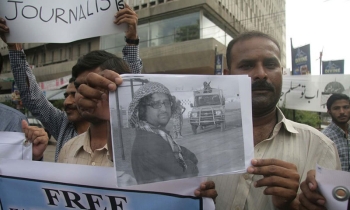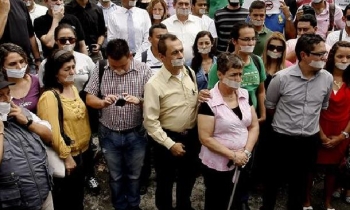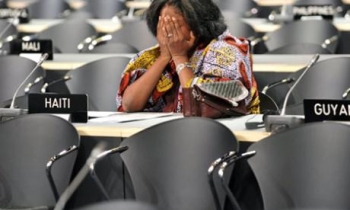Authorities in Rwanda announced on Monday the arrest of two individuals in the murder of journalist Jean-Léonard Rugambage, who was shot late Thursday as he drove through the gate to his home in Kigali. The Committee to Protect Journalists (CPJ) expressed scepticism about the arrests and called on authorities to disclose details of their investigation.
“The burden is on the Rwandan government to conduct a thorough, transparent investigation and to produce credible results,” CPJ Africa Advocacy Coordinator Mohamed Keita said. “We call on Rwandan authorities to heed the words of President Kagame who pledged during his monthly press briefing on Monday that the government would ‘get to the bottom’ of this matter.”
Speaking at a press conference on Monday, Rwandan Internal Security Minister Moussa Fazil Harelimana said one of the suspects “has admitted guilt," Agence France-Presse (AFP) reported. "He told the police he committed the act to take revenge against this journalist, who killed his brother in the 1994 Tutsi genocide," according to the same source.
Authorities have not disclosed the identities of the two suspects. In 2007, a traditional “gacaca” court had cleared Rugambage of any involvement in the genocide, according to local journalists.
Rugambage has been the target of official persecution over several years because of his critical coverage of the government, CPJ research shows. While working as a reporter for the now-defunct independent tabloid Umuco, Rugambage was imprisoned for 11 months in 2005-06 over a story alleging mismanagement and witness tampering in Rwanda's traditional courts.
Meanwhile, ARTICLE 19 called upon the Government of President Paul Kagame to investigate all incidents of violence against activists, journalists and human rights defenders, in the lead up to Rwanda’s August elections, and ensure they are able to carry out their legitimate activities in safety.
Following the killing of Rugambage, ARTICLE 19 said it was is greatly concerned by increasing threats to activists and media workers in Rwanda, particularly those perceived to be critical of the Government. On the morning he was killed Rugambage published an online article alleging that the Rwandan Government was behind the murder of one of their most outspoken critics, former General Faustin Kayumba. Shortly after 10 pm Rugambage was shot dead in his car.
“We condemn the killing of the late Rugambage and call upon the government to ensure that those who committed this heinous act face justice. At the same time we wish to remind the authorities of their primary responsibility to provide security for the people of Rwanda,” said Agnes Callamard, Executive Director, ARTICLE 19.
“The loss of life, under whatever circumstances, is deplorable and particularly troubling during what should be a democratic election. The continued intimidation of dissenting voices in Rwanda shows the extent of the current regime’s intolerance and prevents political commentary, directly limiting the ability of opposition parties to participate,” she said.
At the time of his murder, Rugambage was acting editor of Umuvugizi, a leading independent news outlet and one of the very few critical voices in Rwanda. In April, the government banned the weekly newspaper from publication during the run-up to the August presidential election. After the newspaper moved online this spring, domestic access to its website was blocked.
Rwandan authorities have moved quickly and assertively to deny any government involvement in Rugambage’s murder, according to CPJ. Police issued a statement on Sunday condemning “fictional accounts” that suggested government agents could have been involved, the pro-government daily New Times reported. On Saturday, government spokeswoman Louise Mushikiwabo called suggestions of government involvement “outrageous,” New Times said.









